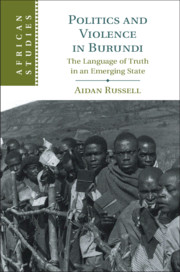Book contents
- Politics and Violence in Burundi
- African Studies Series
- Politics and Violence in Burundi
- Copyright page
- Contents
- Figures and Maps
- Acknowledgements
- Linguistic and Orthographic Note
- Glossary of Terms
- List of Abbreviations
- Introduction
- Prologue, 1796–1959
- Part I 1959–1961: ‘To See the Son of a King’
- Part II 1961–1967: ‘A Most Total Anarchy’
- 3 Abanyabihuha
- 4 Ukuri n’ubutungane
- Part III 1968–1972: ‘Please Send Me a Car to Take Them Away’
- Conclusion
- Bibliography
- Index
- African Studies Series
4 - Ukuri n’ubutungane
The Fate of the Bourgmestres
from Part II - 1961–1967: ‘A Most Total Anarchy’
Published online by Cambridge University Press: 03 October 2019
- Politics and Violence in Burundi
- African Studies Series
- Politics and Violence in Burundi
- Copyright page
- Contents
- Figures and Maps
- Acknowledgements
- Linguistic and Orthographic Note
- Glossary of Terms
- List of Abbreviations
- Introduction
- Prologue, 1796–1959
- Part I 1959–1961: ‘To See the Son of a King’
- Part II 1961–1967: ‘A Most Total Anarchy’
- 3 Abanyabihuha
- 4 Ukuri n’ubutungane
- Part III 1968–1972: ‘Please Send Me a Car to Take Them Away’
- Conclusion
- Bibliography
- Index
- African Studies Series
Summary
This chapter presents three exemplary stories of local bourgmestres on the border. One was a key member of a pro-Hutu opposition party, but attempted to cooperate with the Uprona government by displaying hostility towards Rwanda, while the second tactically changed parties at independence. The third was an Uprona hero from the start. In the turmoil of decolonisation, all three were trapped by political manoeuvring between their local constituents and the upper state: an alliance conducted through petitions and inquiries brought the bourgmestres’ local rivals into collaboration with their hostile superiors. By 1967, all three bourgmestres were eliminated in the same way, by different regimes. While ethnicity and Rwandan treason appeared frequently in the terms of denunciation, they were mostly subordinated in significance to local political circumstances, personal rivalries and the possibilities contained within the terms of official truth. The chapter uses these stories to show the potential for local action in invoking official truth to advance private interests, constituting a mode of citizenship that melded dependency and authority in the manipulation of state obsessions.
- Type
- Chapter
- Information
- Politics and Violence in BurundiThe Language of Truth in an Emerging State, pp. 166 - 194Publisher: Cambridge University PressPrint publication year: 2019

